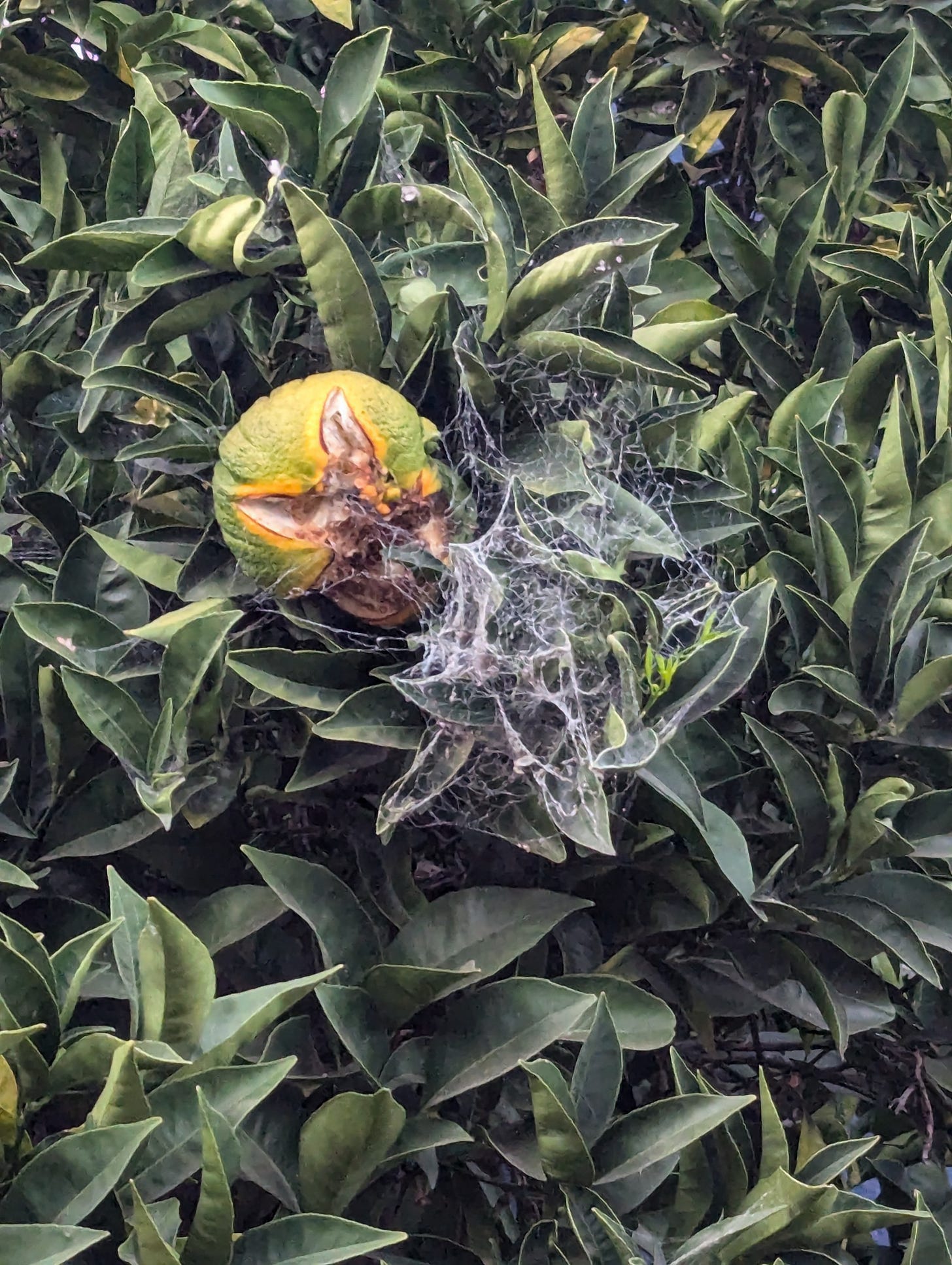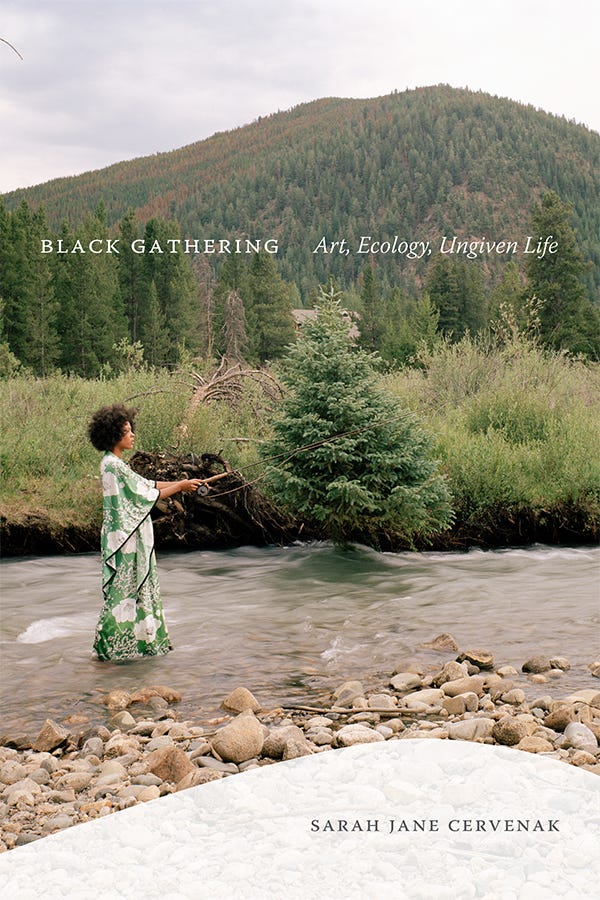“Time is rotting as our bodies wait for now I lay me down to earth. / Noiseless patient spiders paid with dirt when what we want is star dust. If nature / abhors an expensive appliance, why does the planet suck ozone? This is a big ticket / item, a thickety ride. Please page our home and visit our sigh on the wide world’s / ebb.” Harryette Mullen, "Black Nikes"
“I am spiders / on the ceiling of a shadow.” June Jordan, Some ChangesThe weather is finicky and turning itself over like a piece of plantain that refuses to cook thoroughly, meaning a bunch of equally disoriented spiders have been making their way into my apartment. It seems like they too are confused about the change (or lack thereof) in seasons and are insisting on what feels familiar, a slow but sure migration to dry shelter in which they can weave their webs and set up shop for their short yet eventful lives.
My cat welcomes this abundance, tasty treats for her to snack on when her food bowl has gone bare. She prefers their taste over the giant house flies she chases around my living room, leaving their corpses for me to find as evidence of her earning her keep. As for the smaller fruit flies, drain flies, gnats and ants who find themselves drawn to my apartment’s bright colors and warmth, the spiders take care of those in expert fashion. The green gray is turning brown, the evenings come sooner and sooner with each passing day, yet my sense of time is scattered by changing weather patterns and an uncertain future.
When I was younger, I didn’t have the same fear of spiders as others my age (that terror was reserved for moths, oddly enough). Except for brown recluse spiders, which I learned about during a particularly harrowing viewing of Animal Planet, and after seeing a small brown spider no bigger than my pinky nail at the time fall out of my comforter, I slept in my grandmother’s bed for nearly a month until I was convinced that the creature was dead, dead, dead.
Many nights my mother read me anansi tales, stories of a shapeshifting man-spider who used his cunning to always come out on top, no matter the situation. I begrudgingly accepted their presence with the same neutrality I have towards brushing my teeth. During sophomore year of high school, I read “Allowables” by Nikki Giovanni, and naturally, as Giovanni’s words have the power to do, it changed my whole perspective on bugs. I became fascinated with pollinators, pest control, fabulous little creatures that did most of nature’s clean up. Enamored with their instinct, I found myself gazing at crickets, roly polies, spiders and ladybugs, wondering if I could mimic their cleverness in a world hellbent on extinguishing tricksters that made life more bearable.
In my first collection of poems, Heirloom, I include an epigraph by Rex. N. Nettleford, a Jamaican scholar and choreographer who co-founded the National Dance Theatre Company of Jamaica: “annancy [anansi] admirers will probably reply that in order to cope with an unstraight and crooked world one needs unstraight and crooked paths.”
What to do, how to embody the shapeshifter's cleverness, the power of one’s hands to create, manifest, carve, select, adorn. Anansi’s raison d’etre skipped across the Atlantic, changing meaning at every port, each diaspora a new retelling. Coming from a not particularly religious family, I was surprised to learn associations between folklore and heathenism, but this cultural abandonment of eco-spiritual sense helped me better understand colonialism’s stake in severing our understanding of the crossroads. As Nina Simone put it: “The people that built their heaven on your land are telling you yours is in the sky.”
Do spiders think of heaven? Do they spend time debating whether or not there is a realm beyond this one, do they worry that they will not be allowed entry? Do they worry their good works will not be enough repentance for all the soft shelled insects they entrap in their cunning? Spiders are as spiders do: weave, weave, weave down here so that any fallen dreams can be salvaged in a web of their own creation. Feeding the body is as essential as feeding the spirit.
While living in New Haven, an orb weaver (?) created a fabulous web on our balcony. During an angry summer storm, the whole invention was blown away. Power lines were felled, trees blocked roadways, even the Target was out of power and warning patrons not to buy anything from the refrigerator aisles. I was convinced the spider, which already had a much shorter life than I, couldn’t even think to survive such a phenomenon. Yet that evening, I looked out and in the same spot as before, the orb weaver had returned, rebuilt and sat proudly in the center of the most glorious web I had ever seen. This too was a lesson in earthly salvation. How the head, the heart and the spirit challenge each other in careful harmony.
During my summer stint in Buffalo, New York, I started losing my patience. Spiders, insects and anything that could squeeze between the gap of the floorboards and the front door populated the residency. Every time I left the building, the same spider would thread its silk across the entryway, causing me to destroy it almost daily. But it kept coming back. Kept rebuilding. Time and time again.
Over the course of 2024, as I’ve taken on independent projects, teaching gigs, and am finishing out a particularly tumultuous semester as a lecturer at UC Berkeley, I’ve come to accept the fact that I am a slow writer (especially when I am not writing poems). Curriculum writing, while exhilarating, takes a lot of creativity out of me. This newsletter, which was once an opportunity to promote my writing, ended up being another project to keep patchworking. But like the spiders that return to their former grounds, I find myself returning to words to venerate our dead, our expelled, our unhoused, our mad, our incarcerated kinfolk who too just want to return home.
Did you know that when you take spiders outside instead of killing them, it’s likely they’ll die from exposure anyways? They seek warmth and shelter for the same reasons as you and I. Anansi uses his gifts of gab to survive. Perhaps that is what I’m doing too.
Now, I get excited when I see spiders. It’s exhilarating. They are, so to speak, weavers of destiny, and I take their presence as a positive omen. Since the mid 2010s, spider and insect populations have been in decline, some rarer species have disappeared altogether. Like spiders, I wonder where all the insects went. I drive and inspect my windshield, no sticky corpses or half-alive invertebrates clinging to the glass. So many things are in steady decline, never reaching extinction. A constant mutilation. As Gaza, Congo, Haiti, the South, Oakland, Sudan, the jail cell, teaches us, there are things worse than death.
There is a special orange tree a few blocks away from my apartment. Ripening too quickly, it split open, its desiccated insides revealed to the whole neighborhood. Upon closer inspection, a spider . This web is for lack of a better word, crude, chaotic, overwhelming both rind and neighboring leaves. How clever to use a local sweetness to attract what you need. How liberating it is to return to the same home, again and again.
Personal announcements:
I am booking guest speaking engagements, readings and workshops (both virtual and in person) for Winter and Spring 2025 ~ contact me at my website ashiaajani.com
What I’m reading:
Black Gathering: Art, Ecology, Ungiven Life by Sarah Jane Cervenak








